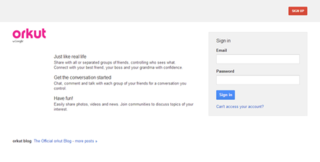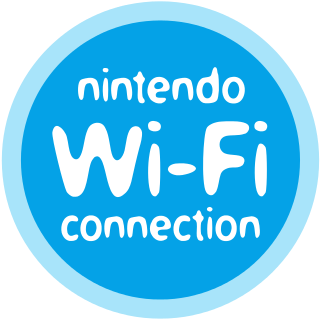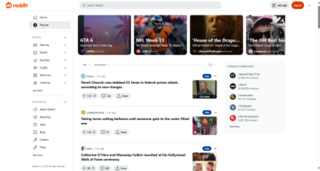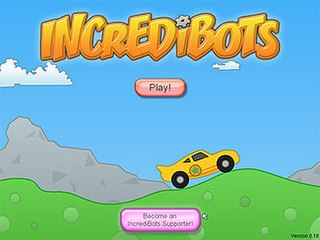Slashdot is a social news website that originally billed itself as "News for Nerds. Stuff that Matters". It features news stories on science, technology, and politics that are submitted and evaluated by site users and editors. Each story has a comments section where users can add online comments.

An Internet forum, or message board, is an online discussion site where people can hold conversations in the form of posted messages. They differ from chat rooms in that messages are often longer than one line of text, and are at least temporarily archived. Also, depending on the access level of a user or the forum set-up, a posted message might need to be approved by a moderator before it becomes publicly visible.

On Internet websites that invite users to post comments, content moderation is the process of detecting contributions that are irrelevant, obscene, illegal, harmful, or insulting with regards to useful or informative contributions. The purpose of content moderation is to remove or apply a warning label to problematic content or allow users to block and filter content themselves.

Orkut was a social networking service owned and operated by Google. The service was designed to help users meet new and old friends and maintain existing relationships. The website was named after its creator, Google employee Orkut Büyükkökten.
Shacknews is a website that hosts news, features, editorial content and forums relating to computer games and console games. It is currently owned by a company called Gamerhub Content Network, who purchased the site in January 2014.

BugMeNot is an Internet service that provides usernames and passwords to let Internet users bypass mandatory free registration on websites. It was started in August 2003 by an anonymous person, later revealed to be Guy King, and allowed Internet users to access websites that have registration walls with the requirement of compulsory registration. This came in response to the increasing number of websites that request such registration, which many Internet users find to be an annoyance and a potential source of email spam.

Tripod.com is a web hosting service owned by Lycos. Originally aiming its services to college students and young adults, it was one of several sites trying to build online communities during the 1990s. As such, Tripod formed part of the first wave of user-generated content. Free webpages are no longer available and have been replaced by paid services.
RateMyTeachers.com (RMT) is a review site for rating K-12 and college teachers and courses. According to its website, its purpose is to help answer a single question: "what do I as a student need to know to maximize my chance of success in a given class?" As of April 2010, over eleven million teachers have been rated on the website.

Nintendo Wi-Fi Connection (WFC) is a defunct online multiplayer gaming service run by Nintendo to provide free online play in compatible Nintendo DS and Wii games. The service included the company's Wii Shop Channel and DSi Shop game download services. It also ran features for the Wii and Nintendo DS systems.

Reddit is an American social news aggregation, content rating, and discussion website. Registered users submit content to the site such as links, text posts, images, and videos, which are then voted up or down by other members. Posts are organized by subject into user-created boards called "communities" or "subreddits". Submissions with more upvotes appear towards the top of their subreddit and, if they receive enough upvotes, ultimately on the site's front page. Reddit administrators moderate the communities. Moderation is also conducted by community-specific moderators, who are not Reddit employees.

The Wii Shop Channel is a former digital distribution service for the Wii video game console. The service allowed users to purchase and play additional software for the Wii, including exclusive games, and games from prior generations of video games. The Wii Shop Channel launched on November 19, 2006, and ceased service operations worldwide on January 30, 2019. As of February 1, 2019, all previously purchased content can still be re-downloaded indefinitely or Wii data can be transferred from a Wii to a Wii U.

4chan is an anonymous English-language imageboard website. Launched by Christopher "moot" Poole in October 2003, the site hosts boards dedicated to a wide variety of topics, from anime and manga to video games, cooking, weapons, television, music, literature, history, fitness, politics, and sports, among others. Registration is not available and users typically post anonymously. As of 2022, 4chan receives more than 22 million unique monthly visitors, of which approximately half are from the United States.
An imageboard is a type of Internet forum that focuses on the posting of images, often alongside text and discussion. The first imageboards were created in Japan as an extension of the textboard concept. These sites later inspired the creation of a number of English-language imageboards.

IncrediBots is a physics simulation game and series produced by Canadian studio Grubby Games and was later purchased by Big Fish Games. It uses the Box2D physics engine, which allows objects created in a simple click and drag fashion to interact realistically. Users can create basic geometric shapes such as triangles, rectangles, and circles, and then connect them together using different types of joints. The three basic kinds of joints are fixed joints, rotating joints, and sliding joints. Once combined with shapes, these joints form what are known as "'bots", "robots", or "IncrediBots". One other kind of joint, thrusters, are like rocket engines.

Quora is a social question-and-answer website and online knowledge market headquartered in Mountain View, California. It was founded on June 25, 2009, and made available to the public on June 21, 2010. Users can collaborate by editing questions and commenting on answers that have been submitted by other users. As of 2020, the website was visited by 300 million users a month.
Controversial Reddit communities are communities on the social news site Reddit, often devoted to explicit, violent, or hateful material, that have been the topic of controversy. Controversial Reddit communities sometimes get significant media coverage.
Anonymous social media is a subcategory of social media wherein the main social function is to share and interact around content and information anonymously on mobile and web-based platforms. Another key aspect of anonymous social media is that content or information posted is not connected with particular online identities or profiles.

James Woodrow was an uncle of United States President Woodrow Wilson, professor at Columbia Theological Seminary, and later president of the College of South Carolina. He was a controversial figure in the Presbyterian Church in the United States in the 1880s.

Yik Yak is a pseudonymous social media smartphone application that initially launched in 2013 and relaunched in 2021. The app, which is available for iOS and Android, allows people to create and view discussion threads within a 5-mile (8.0 km) radius. It is similar to other anonymous sharing apps such as Nearby, but differs from others such as Whisper in that it is intended for sharing primarily with those in proximity to the user.
E-Hentai is an image-hosting and file-sharing website focused on hentai. The site hosts user-generated image galleries primarily of pornographic content originating or derived from anime, manga, and video games, such as fanart, scanlations of manga and dōjinshi, and cosplay photographs. Its sister site Exhentai was spun off from E-Hentai in 2010 to host artwork that depicts material that is illegal in certain jurisdictions, such as lolicon, shotacon, and bestiality.












